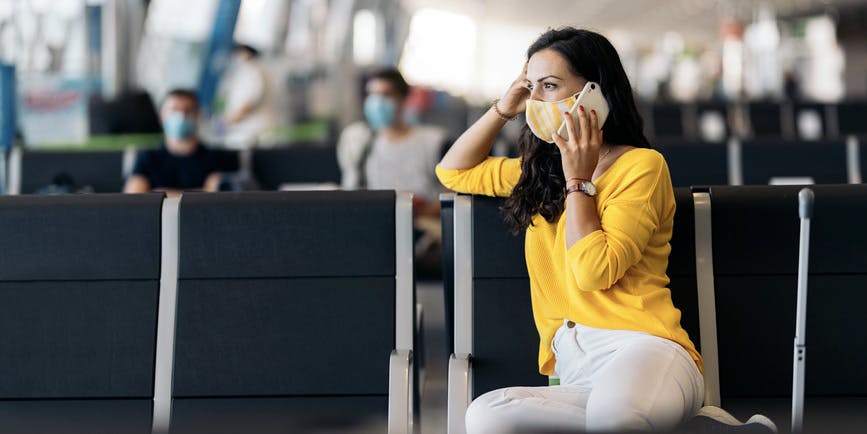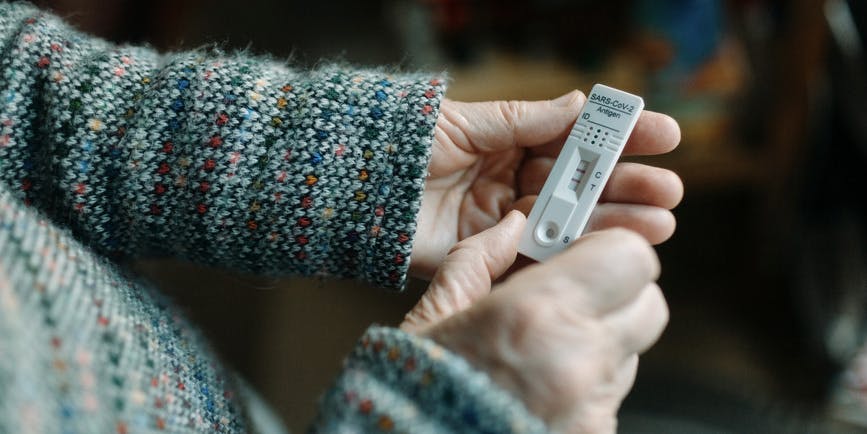
What to know about Covid vaccines in 2023-2024

Topics
Key Points:
- Vaccination lowers the risk of hospitalization, severe illness and death from Covid-19.
- Current Covid-19 vaccines target Omicron XBB variants.
- Covid-19 vaccines are no longer free from the federal government. But most private insurance companies and government-funded programs must provide them to patients at no cost.
Almost 700 million Covid-19 vaccination doses have been administered in the US since the pandemic began. That means a massive amount of vaccine data gives us much to feel confident about.
Here's what to know about Covid-19 vaccine access this winter and how to time your next dose for optimum protection. Plus, how Dr. B can help you get Covid treatment online with a convenient $15 consultation.
What kind of Covid-19 vaccines are available?
Two types of Covid-19 vaccines are available in the US. Neither contain a live virus or enter the nucleus of our cells, so they can't alter our DNA.
- mRNA vaccines. These teach our cells how to make a piece of a protein that triggers an immune response against the coronavirus. Updated Pfizer-BioNTech and Moderna mRNA vaccines have full FDA approval.
- Protein subunit vaccines. These vaccines contain pieces of coronavirus spike proteins. They also help the immune system recognize and respond to those spike proteins. The updated Novavax vaccine has emergency use approval by the FDA.
Are Covid-19 vaccines safe?
Covid-19 continues to cause more respiratory illness hospitalizations than the flu and RSV. And vaccinated people have a lower risk of being hospitalized for and dying from Covid-19 than unvaccinated people. So yes—the Covid-19 vaccines are safe.
Many people are concerned about the risk of myocarditis (heart muscle inflammation) following Covid-19 vaccination. But in reality, this reaction is rare.
- Pre-pandemic, the chance of getting myocarditis was 1.3 per 100,000 people.
- After a Covid-19 vaccine, the chance is 2 per 100,000 people.
- Over 90% of those people recover without medical intervention. They also recover faster than those with non-vaccination myocarditis.
- The risk is higher for men younger than 40 years old—but it’s lower than for those who’ve had a Covid-19 infection.
- There have been only eight recorded deaths of vaccine-related myocarditis worldwide, whereas over one million people in the US have died from Covid-19.
Are Covid vaccines still free?
Covid-19 vaccines are no longer provided for free by the federal government. But most people in the US can get them at no cost, depending on your health insurance status.
- Private insurance: Health Insurance Marketplace and most private insurance plans must provide Covid-19 vaccines for free. That means you won’t have to pay a copay or use coinsurance. Make sure to use an in-network provider or confirm the cost with your health insurance provider before you schedule your next vaccine.
- Medicare: Those with Medicare coverage will not pay anything for a Covid-19 vaccine, including immunocompromised people who require additional doses.
- Medicaid: Older adults with Medicaid coverage can receive Covid-19 vaccines at no cost.
- Veterans and active military: The VA provides free vaccines to veterans enrolled in VA healthcare programs. Military members enrolled in TRICARE also get vaccines for free.
- The uninsured: The CDC’s Bridge Access Program makes vaccines available for free at participating health centers, pharmacies and provider offices. You may also be eligible for bridge coverage if your private insurance provider does not cover vaccine costs.
What Covid-19 vaccines are available—and when should you get your next shot?
As of September 2023, updated Pfizer-BioNTech, Moderna and Novovax vaccines have been formulated to target Omicron XBB variants. The bivalent boosters that came out last year in the fall of 2022 are no longer available.
The CDC recommends that everyone over five years old should get an updated Covid-19 vaccine or booster. Aside from that, when you get your next dose is up to you.
Here are some timing tips from epidemiologists who advise the CDC:
- To protect against severe illness: Studies suggest that the bivalent boosters did not protect immunocompromised people for as long as they did healthy people. So if you have a compromised immune system, are older or have an underlying medical condition, get your next vaccine as soon as possible.
- To protect against infection: Try to time your booster before a Covid-19 wave. These can be hard to predict. But aim for a few weeks before holidays, deep winter weather or travel.
- If you’ve recently had Covid-19: Covid-19 infection also helps the immune system protect against Covid-19 infection. So you can wait 3-4 months after your infection to get your next dose.
How Dr. B can help you get Covid-19 treatment online
Dr. B does not provide Covid-19 vaccines.
But if you’re at high risk for severe illness and have an active infection? Dr. B can help you get treatments for Covid-19 online with a convenient $15 consultation. If your health insurance does not cover the oral antiviral medication cost, we’ll help you find the lowest Covid medicine price at your local pharmacies.
Learn more about How It Works, or get started today!
Sources:
The Centers for Disease Control and Prevention. (2023). Covid-19 data tracker.
The Centers for Disease Control and Prevention. (2023). How Covid-19 vaccines work.
The Centers for Disease Control and Prevention. (2023). Stay up to date with Covid-19 vaccines.
The Centers for Disease Control and Prevention. (2023). Respiratory viruses: illness severity.
Couzin-Frankel, J., (2022). Heart risks, data gaps fuel debate over COVID-19 boosters for young people. Science.
Heymansm S., et al. (2022). Myocarditis after COVID-19 mRNA vaccination: clinical observations and potential mechanisms. Nature.
Link-Gelles, R., et al. (2023). Estimates of bivalent mRNA vaccine durability in preventing Covid-19-associated hospitalization and critical illness among adults with and without immunocompromising conditions. Vision Network.
National Institutes of Health. (2022). Covid-19, vaccines, and myocarditis.
Oster, M.E., et al. (2022). Myocarditis cases reported after mRNA-Based COVID-19 vaccination in the US from December 2020 to August 2021. The Journal of the American Medical Association.
Patone, M., et al. (2022). Risk of myocarditis after sequential doses of Covid-19 vaccine and SARS-CoV-2 infection by age and sex. Circulation.
US Food and Drug Administration. (2023). Janssen COVID-19 vaccine.
US Food and Drug Administration. (2023). FDA authorizes updated Novovax Covid-19 vaccine formulated to better protect against currently circulating variants.
Topics
Sign up for the free Dr. B newsletter for a weekly report on the latest in healthcare + research-based advice for staying healthy and mentally well.
Related articles












